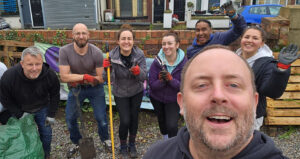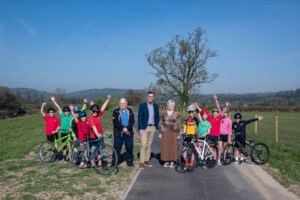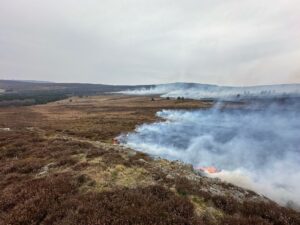Ella Robertson McKay Explains How Young Activists Can Find and Build Community of Their Own

For One Young World and Managing Director Ella Robertson McKay, establishing a more cohesive global community is everything. The organization is helping entrepreneurs, activists, and humanitarians hone their leadership skills and find their tribe for a brighter tomorrow.
“Build community,” she emphasizes. “Look around. [Ask] who is not in the room, who could we invite into the room? And in terms of diversity and inclusion, I really believe that movements that aren’t inclusive of every race, gender, nationality, disability, religion will not be strong movements. Who’s in power groups that are seemingly working against you, because actually, those might be the people you really need to persuade in order to make a change.”
Robertson McKay emphasizes the importance of combining skills with passion when pursuing activism. She suggests that individuals identify their strengths and pair them with causes they care about deeply. For example, someone with a flair for journalism could apply those talents to women’s health care initiatives. This approach allows activists to contribute effectively while leveraging their existing capabilities.
Ella Robertson McKay Explains How To Nurture Community
Making a true impact in the world doesn’t happen overnight, but slow and steady progress can build momentum for a cause over time.
Robertson McKay suggests joining established movements rather than starting new organizations from scratch. She notes that in the U.K., approximately 5,000 charities are founded annually, with a similar number closing each year. This pattern indicates that many people create initiatives based on personal experiences without first exploring existing efforts in the same space. Robertson McKay advises budding activists to research and connect with groups already working on their chosen issues, as this can lead to greater impact through collaboration and shared resources.
Building an inclusive community is another crucial aspect of effective activism, according to Ella Robertson McKay. She encourages aspiring leaders to consider who might be missing from their current circles and actively work to bring diverse voices into the conversation. Robertson McKay stresses that strong movements must be inclusive to achieve lasting change.
“Is our movement inclusive? Is our movement welcoming?” Robertson McKay pondered during a TEDx Talk. “Why do some people feel that this space isn’t the place for them? Because if we’re building movements that don’t include people regardless of race, religion, gender, identity, disability, our movements will be sorely lacking.”
Additionally, Robertson McKay suggests that activists look beyond their immediate allies and consider engaging with individuals or groups that may initially seem opposed to their cause. She notes that these unexpected connections can sometimes lead to progress by finding common ground on specific issues, even if broader disagreements exist.
“Everything in life is yin and yang, and activism is very much the same,” she added. “Sometimes opposing forces are actually very complementary.”
Ella Robertson McKay also addresses what she calls the “three deadly sins of activism” that can hinder progress and create disconnects between street-level action and policy outcomes. The first is “slacktivism,” where individuals believe that sharing posts on social media constitutes meaningful action. She points out that while online engagement can raise awareness, it often fails to translate into tangible results.
The second “sin” Robertson McKay identifies is “pure think,” a form of groupthink that leads activists to work exclusively with like-minded individuals. She cautions against this insular approach, as it limits opportunities to reach and persuade those who may not already support the cause.
Robertson McKay further warns against tactics that alienate potential allies or the general public. She stresses the need for movements to be strategic in their use of disruptive actions, balancing attention-grabbing demonstrations with less-visible but equally important behind-the-scenes work.
To illustrate effective community-building, Ella Robertson McKay highlights examples from One Young World’s global network. The organization brings together budding leaders from diverse backgrounds, fostering connections across countries and cultures. This approach allows participants to share ideas, learn from one another, and collaborate on solutions to global challenges.
The progressive business leader notes the importance of providing platforms for fledgling activists to showcase their work and connect with influential figures. One Young World’s annual summit offers such opportunities, allowing emerging leaders to engage with established change-makers and gain visibility for their causes.
In terms of maintaining motivation, Ella Robertson McKay stresses the value of a gratitude mindset. She encourages activists to recognize the relative privilege they may have compared to those facing more dire circumstances, using this perspective as fuel for continued action rather than a source of guilt.
Many One Young World ambassadors have been enthusiastic about how involvement with the cause has changed their lives and how they view global interaction.
“One Young World is a great example of collective bargaining,” ambassador Grace Forrest, who attended the summit held at The Hague in 2018, said in a video. “They give a voice to young people who are passionate and really getting stuff done.”
“The best part about being a One Young World ambassador is being able to meet so many people who are as passionate as you,” said Angela Mae Minas of being present at the Zurich summit in 2011.
“That is so valuable to have that network of like-minded people who are really committed to advocating for positive change around the world to those in charge, those making laws, those running businesses, and also those working on the ground,” 2013 Johannesburg summit attendee Emily Revess said in the same video.
For those looking to engage with One Young World and its community of trailblazers, Robertson McKay outlines several pathways. Thought leaders making a difference in their communities can apply to attend the organization’s global summit, with numerous scholarship opportunities available. For businesses and large organizations interested in supporting youth leadership, she invites everyone to get involved.
Through these various strategies and approaches, Ella Robertson McKay and One Young World aim to harvest a global community of eager activists equipped to address pressing challenges and drive positive change in their respective spheres of influence.
“We need everybody,” Ella Robertson McKay rallied. “So I would say find your community, bring your skills, and build that community as widely as you can.”





